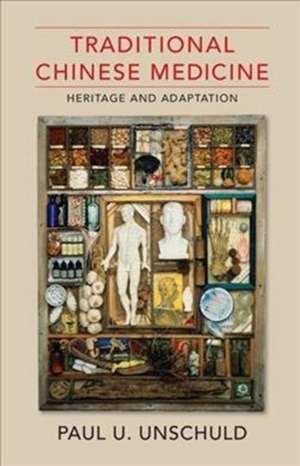Traditional Chinese Medicine – Heritage and Adaptation
Autor Paul U. Unschuld, Bridie Andrewsen Limba Engleză Paperback – 8 ian 2018
Preț: 169.97 lei
Nou
Puncte Express: 255
Preț estimativ în valută:
32.54€ • 33.46$ • 26.99£
32.54€ • 33.46$ • 26.99£
Carte disponibilă
Livrare economică 29 ianuarie-12 februarie
Preluare comenzi: 021 569.72.76
Specificații
ISBN-13: 9780231175012
ISBN-10: 0231175019
Pagini: 192
Dimensiuni: 139 x 215 x 15 mm
Greutate: 0.25 kg
Editura: Columbia University Press
ISBN-10: 0231175019
Pagini: 192
Dimensiuni: 139 x 215 x 15 mm
Greutate: 0.25 kg
Editura: Columbia University Press
Notă biografică
Paul U. Unschuld is the director of the Institute for the Theory, History, and Ethics of Chinese Life Sciences, Charité-Universitaetsmedizin Berlin. His books include What Is Medicine? Western and Eastern Approaches to Healing (2009) and The Fall and Rise of China: Healing the Trauma of History (2013).
Cuprins
Preface to the English Edition
Introduction
Part I: The Historical Foundations
1. Origins and Characteristics of Chinese Medicine
2. The Lack of Existential Autonomy
3. The Longing for Existential Autonomy
4. Quotations from the Medical Classics
5. The Banality of Violence
6. The Mawangdui Texts
7. Anatomy, Physiology, and Pathology in the New Medicine
8. Deficiencies in the Credibility of the New Medicine
9. The Alternative Model: The View from Illness
10. Radical Healing: Life as a Form of Disease
11. Between Antiquity and the Modern Age
12. Two Medical Authors of the Ming and Qing Dynasties
Part II: Modern and Contemporary Times
13. The Confrontation with the Western Way of Life
14. The Persuasiveness of Western Medicine
15. The Opinions of Intellectuals and Politicians
16. The Selection
17. The Surprise
18. The Creative Reception of Chinese Medicine in the West
19. The Objectification of the Discussion: Opportunity and Challenge
Epilogue
Notes
Index
Introduction
Part I: The Historical Foundations
1. Origins and Characteristics of Chinese Medicine
2. The Lack of Existential Autonomy
3. The Longing for Existential Autonomy
4. Quotations from the Medical Classics
5. The Banality of Violence
6. The Mawangdui Texts
7. Anatomy, Physiology, and Pathology in the New Medicine
8. Deficiencies in the Credibility of the New Medicine
9. The Alternative Model: The View from Illness
10. Radical Healing: Life as a Form of Disease
11. Between Antiquity and the Modern Age
12. Two Medical Authors of the Ming and Qing Dynasties
Part II: Modern and Contemporary Times
13. The Confrontation with the Western Way of Life
14. The Persuasiveness of Western Medicine
15. The Opinions of Intellectuals and Politicians
16. The Selection
17. The Surprise
18. The Creative Reception of Chinese Medicine in the West
19. The Objectification of the Discussion: Opportunity and Challenge
Epilogue
Notes
Index
